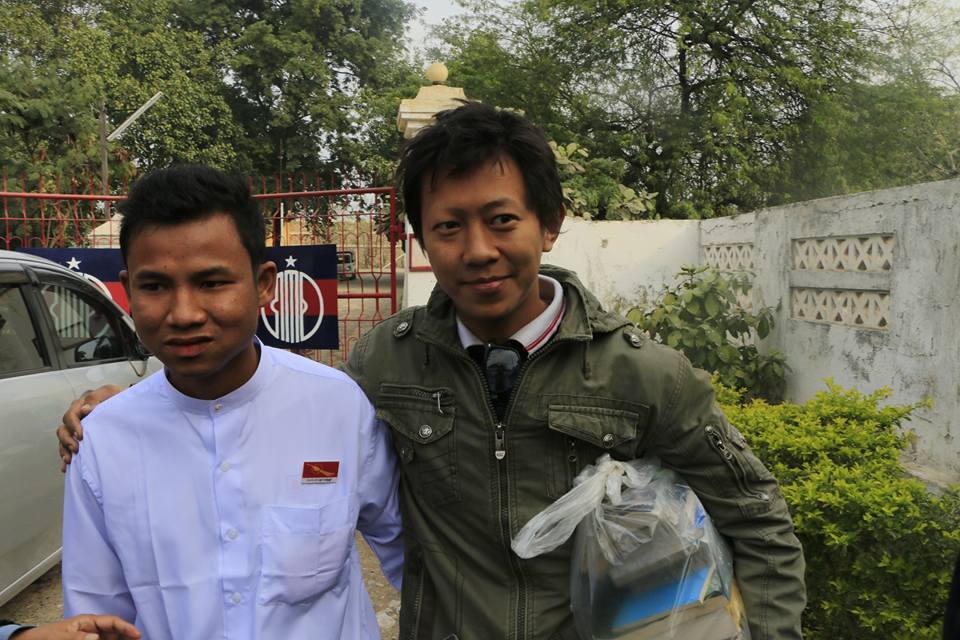Fifty-two political prisoners were among 102 inmates freed from Burma’s jails in an amnesty on Friday.
The release, which included several high-profile prisoners of conscience, comes after recent pressure on the Burmese government from the United States, as well as rights groups Amnesty International and Human Rights Watch.
The office of Burma’s outgoing President Thein Sein announced the decision via social media, after many of the inmates had been freed this morning.
The statement originally in Burmese read:
“Responding to calls from individuals and organisations, the president released inmates serving time in prisons across Burma, out of consideration on social grounds and to allow them to serve the interest of the country, in an amnesty on this day coinciding with the opening of the Word Peace Buddhist Conference after successful hosting of peaceful elections in 2015 and the first round of the Union Peace Conference.”
The order also saw 77 death sentences commuted to life in prison.
This week, US Deputy Secretary of State Antony Blinken called on President Thein Sein to release all political prisoners in the country. “It would be a fitting completion of that legacy to release all political prisoners so that by the time the transition is complete and the new government takes office, no one is in jail because of their political views,” the American diplomat said on Monday.
Among those freed on Friday was Phil Blackwood, a New Zealand citizen jailed for two and a half years for offending the Buddhist religion with an online bar advertisement featuring a stylised image of the Buddha.
Blackwood’s colleagues Tun Thurein and Htut Ko Ko Lwin were not included in the pardon and remain incarcerated, according to Bo Gyi of the Assistance Association for Political Prisoners- Burma (AAPP-B).
Not present on the list of those amnestied was former monk and 2007 Saffron Revolution leader U Gambira, who was re-arrested on Tuesday in Mandalay on a charge of entering Burma illegally. Htin Lin Oo, a former National League for Democracy member jailed for speaking out against hardline Buddhist nationalism in 2014 was not spared either.
One high profile former monk did taste freedom. Shin Naya was freed on Friday after serving six years of an 11-year term. The former monk was arrested in 2010 for the same charge of ‘offending religion’ —Penal Code Article 295(a)— that Htin Lin Oo and the ‘Buddha Bar’ trio were later hit with.
Ahead of his jailing, Shin Naya was the leader of the Moe Pyar Buddhist sect in Burma, famous for lacking the same social restrictions applied to monks of other Buddhist strains, such as Theravada. He was jailed after complaints made by Burma’s highest Buddhist order, the Theravada-practicing Sangha Maha Nayaka.
The AAPP-B spent Friday compiling a list of political prisoners freed from jails across the country, including Rangoon’s Insein, Prome [Pyay], Mandalay, Hpa-an, Myitkyina, Tuangoo and Putao.
The organisation welcomed the release, but noted that 409 political cases remain ongoing in Burma’s judicial system with 114 denied bail.
Kyaw San, himself a member of a support organisation for former political prisoners in Prome, had been serving a four-month sentence for staging an unregistered protest in August 2014. He was released on Friday with 49 days remaining on his sentence.
“There should be no political prisoners in a democratic country. I would like to urge the president U Thein Sein to release all remaining political activists and students in prisons across the country before transferring power to the new government,” he said shortly after regaining his freedom.
[related]
Remaining in prison are over 50 students arrested in March 2015 after police violently broke up an education reform protest in Letpadan, Pegu Division.
The protests were backed by Burma’s largest student union, the All-Burma Federation of Student Unions, one member of which was released on Friday.
Student unionist Naing Ye Wai was originally due for release in February – having been jailed in July alongside two others for spray painting a political slogan on the wall of Yadanabon University in Mandalay.
Naing Ye Wai said he believes Friday’s amnesty was cheap political point scoring on behalf of the Thein Sein administration, which dissolves in March.
“[Releasing political prisoners is as easy for them as] frying a fish in its own fat,” the former political prisoner said.



